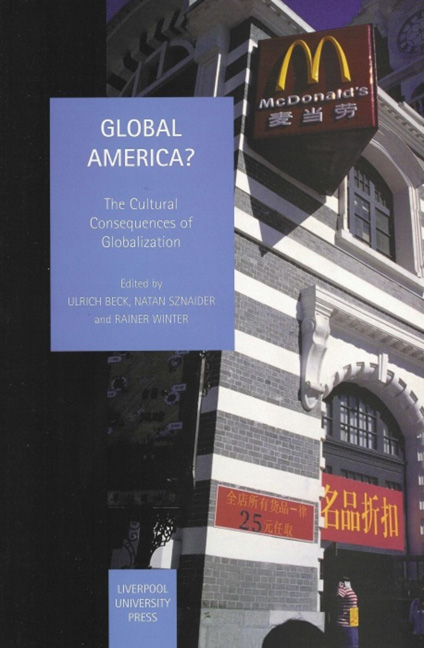Book contents
- Frontmatter
- Contents
- List of Contributors
- Acknowledgments
- Introduction
- PART I THEORETICAL PERSPECTIVES
- PART II NATIONAL CASE STUDIES
- 4 Hyperpower Exceptionalism: Globalization the American Way
- 5 Debating Americanization: The Case of France
- 6 Consumption, Modernity and Japanese Cultural Identity: The Limits of Americanization?
- 7 Americanization, Westernization, Sinification: Modernization or Globalization in China?
- PART III TRANSNATIONAL PROCESSES
- PART IV EPILOGUE
- Rethinking Americanization
7 - Americanization, Westernization, Sinification: Modernization or Globalization in China?
from PART II - NATIONAL CASE STUDIES
- Frontmatter
- Contents
- List of Contributors
- Acknowledgments
- Introduction
- PART I THEORETICAL PERSPECTIVES
- PART II NATIONAL CASE STUDIES
- 4 Hyperpower Exceptionalism: Globalization the American Way
- 5 Debating Americanization: The Case of France
- 6 Consumption, Modernity and Japanese Cultural Identity: The Limits of Americanization?
- 7 Americanization, Westernization, Sinification: Modernization or Globalization in China?
- PART III TRANSNATIONAL PROCESSES
- PART IV EPILOGUE
- Rethinking Americanization
Summary
China has long embraced the golden mean of the Middle Way, yet, since the beginning of the twentieth century, extremism has prevailed. The Cultural Revolution is a typical example of extremism that was a catastrophe for China. The reform promoted by Deng Xiaoping as of the early 1980s was not only significant on the socio-economic level, but also for politics and ideology, since his attempt to stress both the anti-left and the anti-right was a way of avoiding both extremes. Twenty years of reform have shown that Deng basically succeeded, in the sense that extremist ideology no longer dominates Chinese politics. Yet, as the old extremisms faded, new forms were taking their place. Currently the two most popular extremes in China's ideological spectrum are Westernization and its inverse anti-Westernization, or more concretely, Americanization and its contrary anti-Americanization. In fact, these new extremes have affected politics, economy, academia, education, literature, arts, publishing and even people's habits and daily lives.
I would like to highlight a few examples of this Westernization or Americanization that I personally experienced. In 1999, I was invited to deliver a lecture entitled ‘Globalization and its Impacts on China’ for local executives of the Chuyong government, a Minority Autonomous Regional Authority. It was striking in itself to be asked to discuss globalization in an area where the economy is underdeveloped and most people live below the poverty line defined by the state. What was even more telling was that my lecture on globalization was warmly welcomed by the audience and I was asked to present another. One of the topics this audience focused on in particular was the relationship between China and the USA, and China's attempts to become a member of the World Trade Organization. Chuyong is located in a subtropical region that is very good for agriculture. Flowers are one of the major sources of income for the local peasants. There is a wide range of colourful flowers at the market at extraordinarily low prices. I was surprised at the price and was told by my hosts that it was equally low all the year round except February.
- Type
- Chapter
- Information
- Global America?The Cultural Consequences of Globalization, pp. 134 - 150Publisher: Liverpool University PressPrint publication year: 2003



